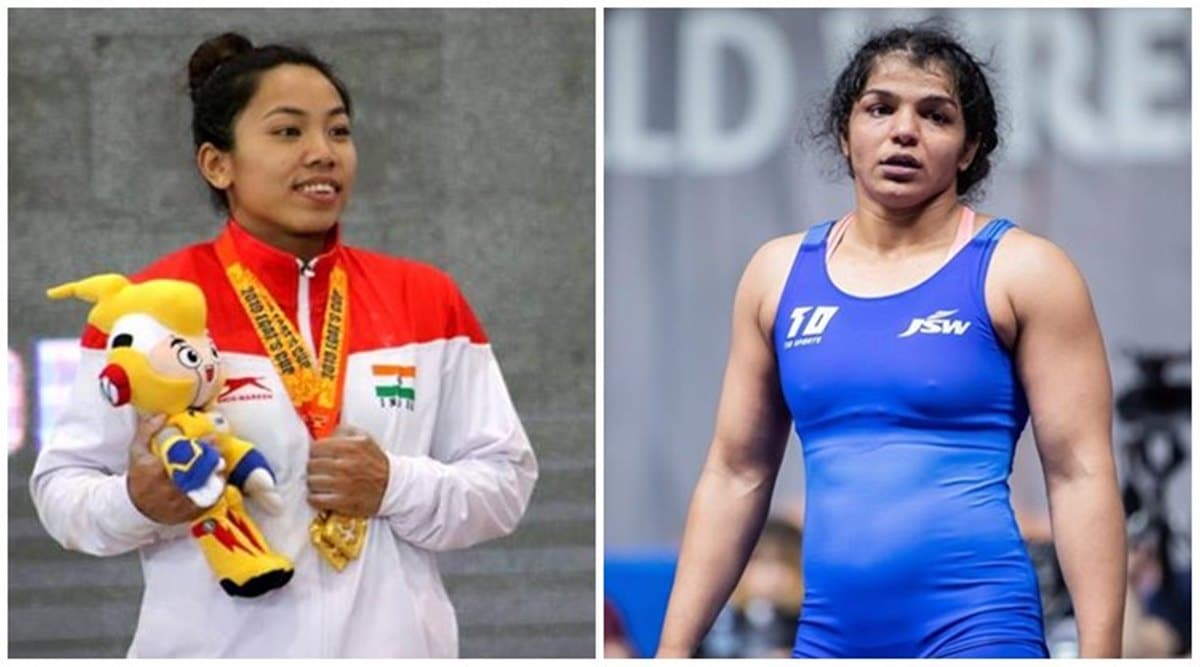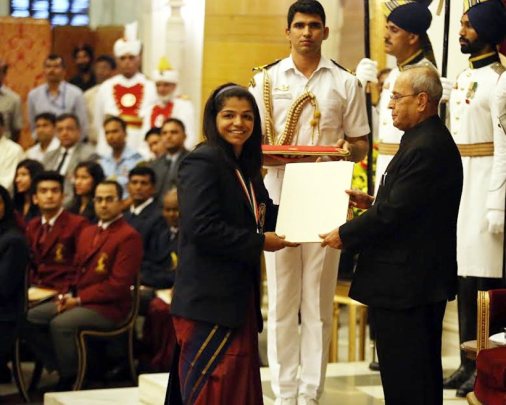 In Frame: Lifter Mirabai Chanu and wrestler Sakshi Malik
In Frame: Lifter Mirabai Chanu and wrestler Sakshi Malik Sakshi Malik is the only individual Olympic medallist in India to never win an Arjuna Award (yet). And while an Olympic bronze doesn’t entitle her to an automatic Arjuna, she’s spent a good part of the last fortnight being told that she is wrong to apply for the honour, since she has the Khel Ratna. Not the credentials, nor the crunching of points, but the chronology of it all; the temerity of the grappler to apply.
A bit of digging would show Sakshi had her reasons and right to apply for the Arjuna.
India’s most popular sports awards have their own ineligibility technicalities in the country’s sportingest of states – Haryana. Quite simply, you are ineligible to be given money, land or job by the state government unless you have the Arjuna Award. A Khel Ratna – usually conferred upon someone deemed to have outstanding performances – doesn’t extend the same benefits.
Every award season is roiling with ugly skirmishes that pit two opposing opinions against each other, though none that have turned as ugly as the sniping against two fine athletes – wrestler Sakshi Malik and lifter Mirabai Chanu, both Khel Ratna winners who applied for the Arjuna this time around. Sakshi, the more vocal of the two, copped much more of the bile.
माननीय प्रधानमंत्री @narendramodi जी ओर माननीय खेल मंत्री @KirenRijiju जी । pic.twitter.com/YF1hQuJfPi
— Sakshi Malik (@SakshiMalik) August 22, 2020
So we have a situation where the unique Olympic medallist – Sakshi Malik, a female wrestler, India’s only woman to medal a bronze at the biggest stage – is not eligible for the perks she absolutely deserves, because in one sensational month in 2016, she burst onto the scene, picked an Olympic bronze, got the Khel Ratna, was feted and celebrated. But no Arjuna. The system had forgotten to ensure the rest of the goodies in the hamper reached her as she leapfrogged over the Arjuna.
Ditto the world champion, Mirabai Chanu, who didn’t register on the wise minds of previous selection committees. So in one breathless moment, she went World Championships…Snatch… Clean & Jerk…Khel Ratna. Again, no stepping stone of the Arjuna. No lasting benefits that matter to sportspersons whose moments in the sun are few, while worries of their uncertain future are forever persistent.
While Khel Ratna makes for a grand statement – a day at the Durbar Hall in the fetching blue blazer, and is labelled the country’s highest sporting honour – the award that truly cloaks an athlete with a semblance of securing the future is the Arjuna.
In a non-Olympic year, Olympic-sized awards list for Khel Ratna, Arjuna
The Arjuna is neither a lesser honour (though a stepping stone it might be), nor redundant by law after a Khel Ratna. So when Sakshi Malik and Mirabai Chanu applied for the Arjuna this year (they made the early list apparently and even sent in their blazer measurements), they did nothing to be frowned upon.
A social media storm with plenty of snark followed. With a jumbo squad of 29 announced, the best this online hostility managed to do was to trim it down to 27 by getting the Sports Ministry to buckle and drop these two. So, two omissions made bizarre headlines rather than the eyebrow-raising five Khel Ratna inclusions in a year that had no (new) significant pinnacles.
When Sakshi appealed on Twitter to be considered, her direct request to apply – entirely legitimate – was construed a sulk and she was reminded of how she already had the Khel Ratna and ought not to ask for the Arjuna.
The Ministry having never mentioned that those with Khel Ratna shouldn’t apply for Arjuna, couldn’t back their original list with their typical habit of swaying opinions to whichever way the gusts blew. They bowed before the social media heckling, by displaying neither conviction in the original list, nor the gumption to stand up for their athletes – one already a medallist, and another strongly tipped to win in the future.
How can Sakshi dare to apply for an Arjuna Award after getting Khel Ratna? How embarrassing it must be to wear the maroon blazer after the navy blue one? How dare she even think….? All those questions laced with righteous outrage and tossed on Twitter easily with the snarling stress on each syllable of H..O..W.
The answer was rather simple.
 Sakshi Malik receiving the Rajiv Gandhi Khel Ratna Award in 2016. (Express Photo)
Sakshi Malik receiving the Rajiv Gandhi Khel Ratna Award in 2016. (Express Photo)
Here’s how: It’s the same way Sakshi thought and believed on Day 13th of the Rio Olympics that she could buck the horror trend of Indians simply not winning an Olympic medal at those Games, to calmly open India’s account after a nightmare of a dozen days stuck at zero.
It was here that Sakshi, the fresh faced 22-year-old with bright black glinting button eyes from Rohtak, made a mockery of reputations – that extremely revered commodity in wrestling which hasn’t quite let go of its blind worship of pedigree and glorying in head-to-head honour.
This pre-bout ritual by the diehards of building up a warrior to the sky based on a nerdy assessment of their capabilities, often comes a cropper when upsets occur.
It’s sport.
Jordan Burroughs was so overwhelmingly drummed up as the favourite in 74kg, the world’s most contested category at Rio, that when he couldn’t actually get a medal, there was a global meltdown in wrestling circles.
A similar non-acknowledgement of what Sakshi was capable of had surrounded her – though the young wrestler herself seemed to be making the most of flying under the radar.
Here’s what Sakshi’s build-up looked like: perhaps the closest mention of her and glory in the same paragraph in newspapers in 2016 was when Sachin Tendulkar met the wrestlers to wish them luck, and she was the name listed as the (58kg) category.
The remote awards: National sports awardees to attend function from various SAI centres
Her win at a circuit/training meet in Spain in the lead-up summer, didn’t merit too many mentions. Experts talked up Vinesh Phogat, Yogeshwar Dutt, Narsingh Yadav (to the very end, hoping IOA’s backroom boys will sneak him into the draw like Olympics is some college admission with a ‘sifaarish’ chit slipped in to the Games organisers without the WADA snorting away the amateurish stunt) and Sandeep Tomar, the Greco Roman grappler.
With Geeta Phogat, the celebrated muse of the movie Dangal, having hitherto dominated 58kg, Sakshi securing the quota in the fabled division, started almost as an upstart. Geeta had been India’s first female wrestler to London and helped set up the Phogat dynasty. What’s more, there was the “real-deal” in that family: Vinesh, a bonafide talent, gutsy and cerebral.
Quite simply, Sakshi even caught a medal-starved India, desperate to break the ‘zero mark’ at a torrid Games off-guard with her surprise medal. Experts remained baffled. The word ‘fluke’ made its first appearance the same night she won a medal.
So who is anyone to diminish her medal as fluke, if when needed, she could summon the force in her feet plonked between the opponent’s and ram her head and slam her shoulder through their armpits to destabilise them and secure a clutch of points that gave her back-to-back come-from-behind wins.
Rohit Sharma to Vinesh Phogat: Meet the five Khel Ratna recipients of 2020
It’s how Olympic medals work. They are not meant to be an acknowledgement of a lifetime’s body of work, though they might end up a culmination of all the effort. Flukes simply don’t fetch medals.
Coming back to the present conundrum; it is no one’s argument that the Olympics should automatically fetch her a second honour – the Arjuna, awarded for international performances, even if there’s no law stopping someone from applying for one.
As an athlete who believes she deserves one, the basic, decent response would be spelling out why she doesn’t. An esteemed committee with no less than Virender Sehwag in it (he holds nothing back) as well as the Sports Ministry ought to have the conviction to talk the hard talk if they believe her subsequent medals – silver and bronze medals at CWG and Asian Championships are not worthy of an Arjuna. They are even within their rights to communicate to her – respectfully – that nothing less than a gold at CWG or Asiad will make the cut.
No one should aim for anything after winning the Khel Ratna by that measure. The Arjuna Award is more than an abstract honour – it’s good money (and India should stop asking its Olympic athletes to be coy about money), it’s a well-carved trophy, it’s a bunch of perks which are inexplicably not extended to Khel Ratna and it’s a definite box to tick in Indian sport, so what if it’s presumed to be in the reverse order?